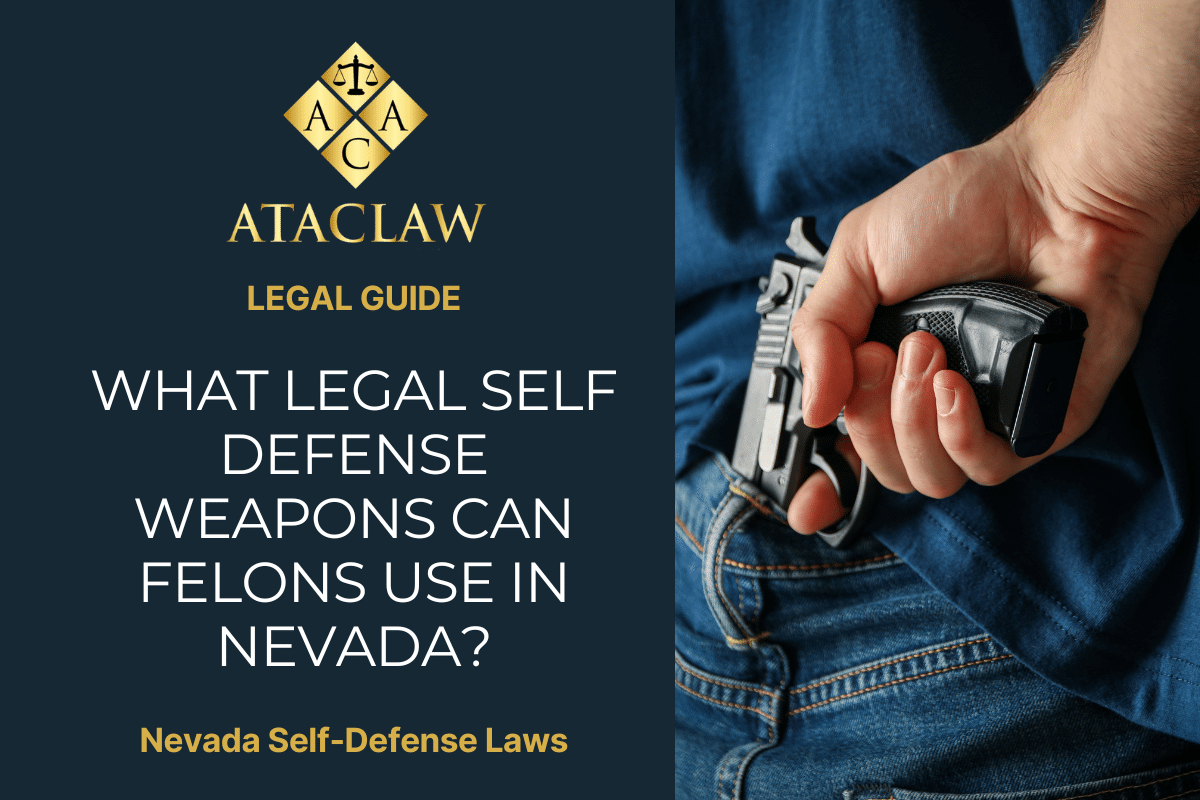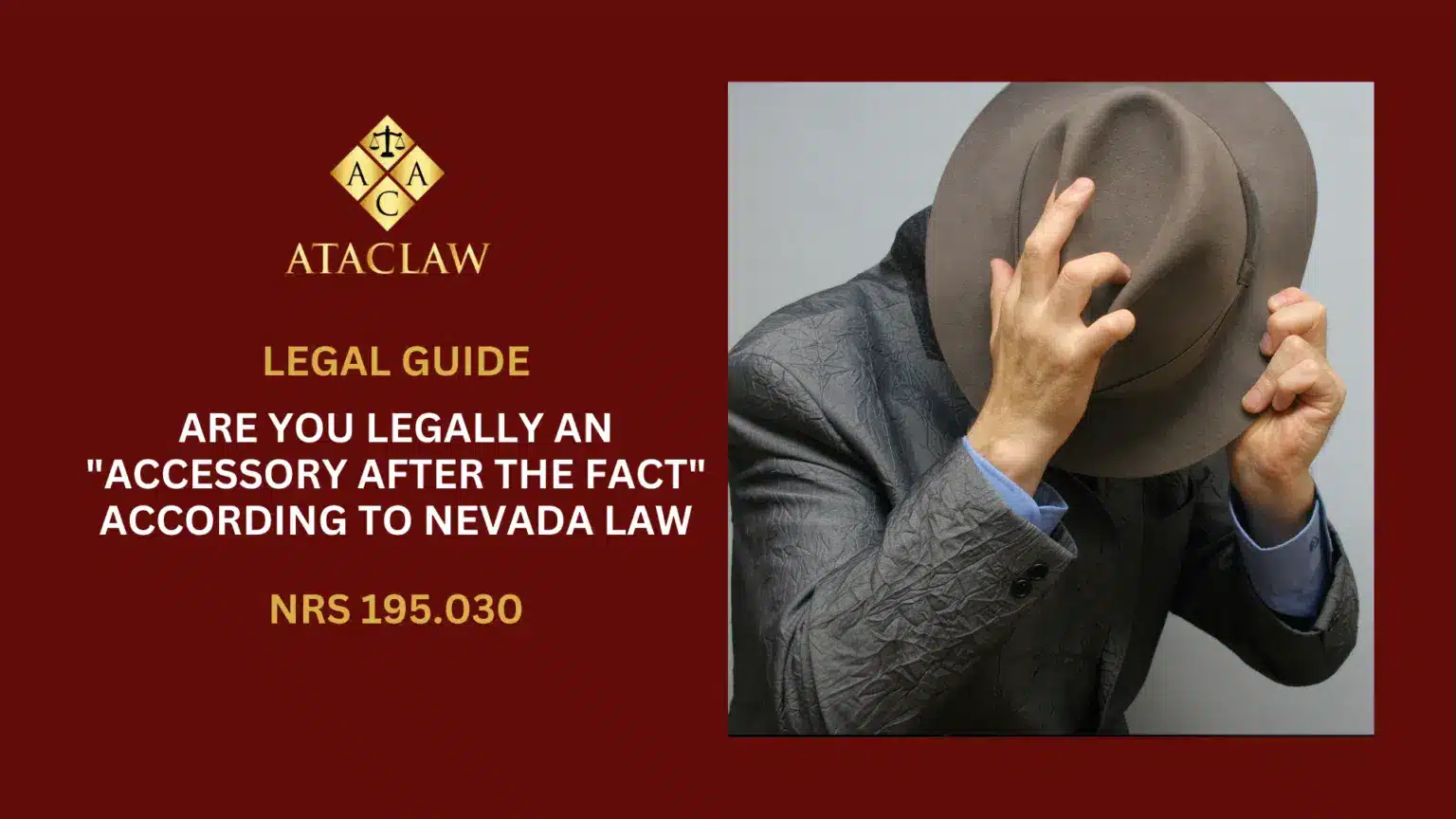ATAC Law often encounter questions about legal self-defense weapons, especially from individuals with felony convictions. In Nevada, the right to self-defense is protected by law, but felons face unique challenges when it comes to weapon possession. This topic has a significant impact on personal safety and legal compliance, making it crucial to understand the nuances of Nevada law regarding self-defense for felons.
We’ll explore Nevada’s self-defense laws for felons, examining the legal non-firearm weapons available to them. We’ll also discuss the restrictions on weapon possession for felons, analyze self-defense situations, and look at the legal consequences of self-defense actions. Understanding these aspects is essential to navigate the complex intersection of self-defense rights and felony status under Nevada law.
Nevada’s Self-Defense Laws for Felons
It is crucial to explain Nevada’s self-defense laws, which apply to all individuals, including those with felony convictions. These laws are designed to protect the right to self-defense while establishing clear guidelines for when the use of force is justifiable.
Stand Your Ground Doctrine
Nevada is considered a “stand your ground” state, which means individuals have no duty to retreat when faced with a threat, even if they have the opportunity to flee. This doctrine allows people to use reasonable and proportional force to defend themselves or others against imminent harm.
To legally “stand your ground” in Nevada, four conditions must be met:
- You reasonably fear immediate death or serious bodily harm to yourself or others.
- You did not initiate the conflict.
- You are not engaging in any illegal activity.
- You are not trespassing.
It’s important to note that while the law permits standing your ground, it’s often advisable to retreat to safety if possible. In my experience, overzealous prosecutors may still bring charges against individuals who lawfully stood their ground.
Castle Doctrine
While Nevada doesn’t formally use the term “Castle Doctrine,” the state has statutory provisions that embody this principle. These laws are outlined in NRS 200.120 and NRS 200.130, which define justifiable homicide as including the defense of an occupied dwelling or motor vehicle when an intruder attempts to enter with the intent of committing a violent crime.
Under these provisions, there is no duty to retreat if:
- You are not the original aggressor.
- You have a right to be at the location.
- You are not otherwise violating the law.
The Castle Doctrine in Nevada allows for the use of deadly force to protect an occupied home or vehicle if the intruder appears dangerous and poses a risk to the occupants. It’s crucial to understand that this doctrine does not apply to unoccupied properties.
Reasonable Force
Nevada law allows individuals to use force in self-defense situations, but two conditions must be met:
- You have a reasonable belief that the aggressor poses an imminent threat of harm.
- You don’t use any more force than necessary to stop the aggressor from harming you.
The use of deadly force is permissible only if the situation presents an immediate threat of death or serious injury and other statutory elements are satisfied [9]. It’s important to note that deadly force is not justified if the original aggressor is fleeing and no longer poses a threat, or to stop a non-violent crime.
For felons, it’s crucial to understand that while these self-defense laws apply to them, there are additional restrictions they must consider. Technically, a convicted felon cannot use a firearm for self-defense because the law prohibits felons from owning or possessing firearms. Even touching a firearm is considered possession, which would violate the law.
In most cases, the best defense strategy for a convicted felon in a self-defense situation is to retreat. If faced with a self-defense scenario, a felon must choose between defending themselves and potentially revealing an illegal firearm in their possession, or retreating to avoid legal complications.
While there are other ways to defend oneself, firearms are often the most efficient and effective. However, given the legal restrictions on felons possessing firearms, retreat is usually the safest choice in most situations.
It’s essential for felons to be aware of these laws and restrictions to navigate self-defense situations legally and safely. If you’re a felon facing charges related to self-defense, it’s crucial to seek representation from an experienced criminal defense attorney, as these cases can be extremely complex .
Legal Non-Firearm Weapons for Felons
As a lawyer, I often get questions about what legal self-defense options are available for felons in Nevada. While felons face restrictions on weapon possession, there are still some legal non-firearm weapons they can use for self-defense. Let’s explore these options in detail.
Knives
In Nevada, the laws regarding knife possession are relatively permissive. All knives are legal to own, and you can carry them in most places, with some exceptions [15]. However, felons need to be aware of certain restrictions:
- Blade Length: You can carry a knife in public as long as the blade is shorter than four inches.
- Concealed Carry: It’s illegal to carry any knife concealed, regardless of blade length. In Clark County, you need the sheriff’s permission to carry a concealed blade that is three inches or longer.
- Prohibited Locations: You cannot carry knives in schools, childcare facilities, or public universities.
- Specific Types: While most knives are legal, it’s important to note that switchblades, stilettos, and balisong knives are illegal to carry in public.
The penalties for violating these laws can be severe. For instance, carrying a concealed knife without a permit is a gross misdemeanor for the first offense, punishable by up to 364 days in jail and/or up to $2,000 in fines.
Pepper Spray
Pepper spray is another legal self-defense option for felons in Nevada. Here are some key points to remember:
- Legality: Pepper spray is legal to buy, own, and carry in Nevada.
- Usage: It can only be used for lawful self-defense. Using pepper spray for any other reason is considered criminal battery.
- Natural Substances: Nevada law explicitly exempts sprays made from “natural substances,” which includes pepper spray.
- Restrictions: While some summaries of Nevada laws suggest that possession of pepper spray by felons is prohibited, the actual statutes only prohibit “tear gas” (defined as CS gas) for felons.
It’s important to note that while pepper spray is legal, using it inappropriately can lead to serious legal consequences. Always ensure you’re using it strictly for self-defense.
Tasers and Stun Guns
Tasers and stun guns can be effective self-defense tools, but there are specific regulations for felons:
- Definition: Nevada law uses “taser” and “stun gun” interchangeably, defining them as devices that emit an electrical charge or current transmitted by projectile, physical contact, or other means.
- Legality: While it’s generally legal to own a stun gun or TASER in Nevada if you’re 18 or older, felons are prohibited from possessing these devices.
- Penalties: Taser possession by ex-felons or fugitives is considered a Category B felony.
- Usage: If legal to possess, tasers and stun guns can only be used for self-defense.
It’s crucial to understand that while these non-firearm weapons can provide some self-defense options for felons, their use and possession are still heavily regulated. Always consult with a legal professional to ensure you’re in compliance with Nevada law. Remember, the best strategy in most situations is to retreat if possible, as using any weapon, even in self-defense, can lead to complex legal situations.
Restrictions on Weapon Possession for Felons
As a lawyer, I find it crucial to explain the restrictions on weapon possession for felons, as they significantly impact an individual’s right to self-defense. These restrictions are governed by both federal and state laws, with some exceptions that may apply in certain circumstances.
Federal Laws
Under federal law, individuals convicted of a felony face severe restrictions on firearm possession. The law is clear: anyone convicted of a crime punishable by imprisonment for more than one year is prohibited from possessing any firearm or ammunition. This prohibition applies to all locations, whether inside or outside the home.
The federal statute that outlines these restrictions is 18 U.S.C. § 922(g). This law identifies nine categories of “prohibited persons,” which include:
- Felons
- Fugitives
- Unlawful users of or addicts to controlled substances
- Individuals adjudicated as mentally “defective” or involuntarily committed to mental institutions
- Illegal aliens and certain non-immigrant aliens
- Persons dishonorably discharged from the armed forces
- Those who have renounced their U.S. citizenship
- Subjects of qualifying domestic protection orders
- Persons convicted of misdemeanor domestic violence crimes
The penalties for violating these federal restrictions can be severe. A prohibited person found in possession of a firearm can face up to 10 years in prison and a fine of up to $250,000. In cases involving “armed career criminals” – individuals with three or more convictions for serious drug offenses or violent felonies – the mandatory minimum sentence increases to 15 years without parole.
Nevada State Laws
In Nevada, state laws align closely with federal regulations regarding felon weapon possession. Under Nevada law, convicted felons are prohibited from owning or possessing any type of firearm. This restriction extends to individuals convicted of domestic violence crimes as well.
The Nevada Revised Statutes (NRS) provide specific guidelines on this matter. NRS 202.360 makes it unlawful for any person who has been convicted of a felony in Nevada, any other state, or under federal law to own or have in their possession or under their custody or control any firearm. This applies to any firearm, whether loaded or unloaded, operable or inoperable.
Violations of this law in Nevada are treated as felony offenses. If convicted, a felon found in possession of a firearm can face:
- A minimum of one year in state prison
- Up to six years in state prison
- A fine of up to $5,000
It’s important to note that these penalties are in addition to any federal charges that may be brought against the individual.
Exceptions
While the restrictions on felon weapon possession are stringent, there are some exceptions and pathways to rights restoration. Under federal law, a convicted felon may be permitted to possess a firearm if:
- The conviction has been expunged
- The conviction has been set aside
- The individual has been pardoned
- The felon’s civil rights have been restored by the state where the felony occurred
In Nevada, a convicted felon has the option to request a pardon from the government for past crimes. While a pardon doesn’t erase the conviction, it can restore certain civil rights, including the right to bear arms.
However, it’s crucial to understand that the restoration of rights is a complex process. Even if a state restores a felon’s civil rights, any state restrictions on firearm possession will still result in a violation of federal law if the individual possesses a firearm.
As a lawyer, I always advise clients that navigating these laws can be challenging. If you’re a felon facing weapon possession charges or seeking to restore your rights, it’s essential to consult with an experienced attorney who can guide you through the intricacies of both federal and state laws.
Self-Defense Situations for Felons
As a lawyer, I often encounter cases involving felons in self-defense situations It’s crucial to understand that while felons have the right to protect themselves, they face unique challenges due to their legal status. Let’s explore some common scenarios and the legal implications for felons.
Home Invasion
In Nevada, the “Castle Doctrine” plays a significant role in home invasion cases. This doctrine, embodied in NRS 200.120 and NRS 200.130, allows for the use of force, including deadly force, to protect an occupied dwelling. However, felons need to be extremely cautious in these situations.
For instance, if a felon hears someone breaking into their home, they have the right to defend themselves. However, using a firearm for self-defense is problematic. Even if the firearm belongs to someone else in the home, a felon touching or using it is considered possession, which violates the law.
Consider this scenario: A felon is home alone when an intruder attempts to break in. The felon has access to a roommate’s legally owned firearm. In this situation, the felon faces a difficult choice:
- Use the firearm for self-defense, potentially saving their life but violating firearm possession laws.
- Avoid using the firearm, complying with the law but potentially risking their safety.
In such cases, the best course of action is often to retreat if possible and call law enforcement immediately.
Public Confrontations
Public confrontations present another challenging scenario for felons. Nevada’s “Stand Your Ground” law, as outlined in NRS 200.120, allows individuals to use force for self-defense without a duty to retreat when they have a legal right to be in that location. However, felons must be extra cautious in these situations.
For example, if a felon is confronted by an aggressive individual in a public place, they have the right to defend themselves. However, they must meet two conditions:
- They must have a reasonable belief that the aggressor poses an imminent threat of harm.
- They must not use more force than necessary to stop the aggressor.
It’s crucial for felons to understand that even in self-defense situations, they cannot use firearms. The law prohibits felons from possessing firearms, and even momentary possession during self-defense would violate this prohibition.
Workplace Incidents
Workplace incidents can also present self-defense situations for felons. In these cases, the same principles of self-defense apply, but with additional considerations due to the workplace setting.
For instance, if a felon is working and a coworker becomes violent, the felon has the right to defend themselves. However, they must be careful not to escalate the situation or use excessive force. The response must be proportional to the threat.
In all these situations, felons should prioritize de-escalation and retreat whenever possible. While self-defense is a right, the legal complications for felons can be severe, especially if weapons are involved.
It’s important to note that in “he said/she said” situations, evidence becomes crucial. Surveillance video and eyewitness accounts can be vital in proving that a felon acted in self-defense and didn’t initiate the confrontation .
In conclusion, while felons have the right to self-defense, their options are more limited compared to non-felons. The best strategy in most situations is to retreat if possible and avoid any actions that could be construed as illegal weapon possession. If faced with a self-defense situation, felons should be prepared to provide clear evidence of the threat and the proportionality of their response.
For Nevada Revised Statutes (NRS) related to legal matters, including sex crimes, fraud charges, DUI charges, domestic violence, and non-homicide self-defense, you can visit the official website of the Nevada Legislature or consult legal databases specific to the state. These resources will provide you with the most up-to-date and accurate information on the relevant statutes.Do you need a Self Defense Attorney in Las Vegas?
If You’re Facing Charges, We’re Here To Help.

Call us for help
“How do you beat a self defense charge in Nevada?”
“When is use of force permitted for self defense?”
What self defense weapons are legal in Las Vegas?
If you needed use of force during an act of self defense, and are now facing charges:
We have answers for you
To learn more about self defense charges in Las Vegas and how to get your self defense charge dismissed or to discuss a particular criminal case that you or someone you love is facing, Call ATAC Law firm for help to get your charges reduced or dismissed.
Contact us for a FREE phone meeting to discuss your case with what people are calling the best criminal defense attorney in Las Vegas.
At ATAC, our Las Vegas team of lawyers is here to work with you to help you through your case.
- Nevada Legislature Website: You can visit the official website of the Nevada Legislature at leg.state.nv.us. The website usually has an easy-to-navigate interface where you can search for specific NRS codes related to different legal categories.
- Legal Databases: Online legal databases such as Nevada Legal Forms or Justia may also provide access to the latest Nevada Revised Statutes.
- Legal Professionals: If you have specific legal questions or need assistance with legal codes, consulting with a legal professional, such as an attorney practicing in Nevada, is always a good idea.





